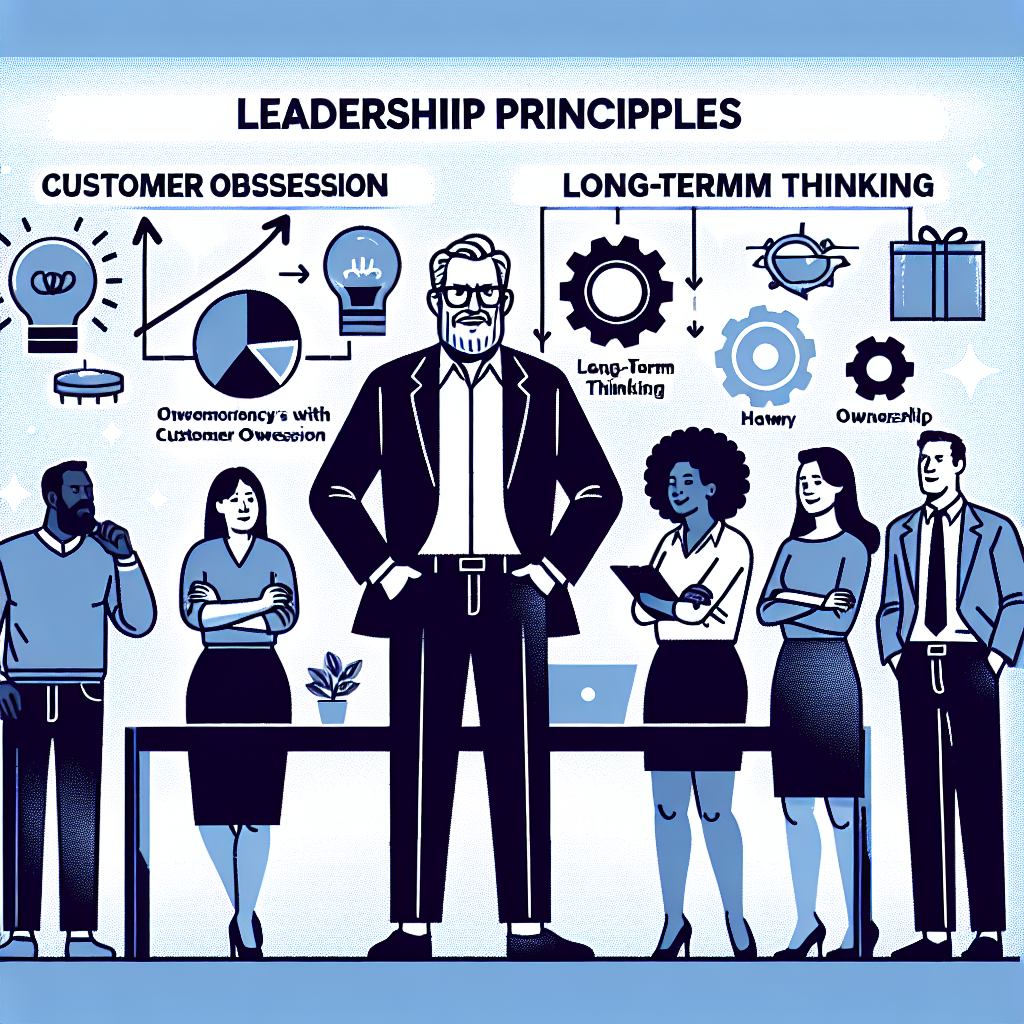Jeff Bezos’ Principles for Building a Customer-Centric Company
Customer Obsession: The Key to Jeff Bezos’ Success
Jeff Bezos, the founder and CEO of Amazon, is known for his relentless focus on customer satisfaction. In fact, he has built his entire business around the principle of customer obsession. This approach has not only made Amazon one of the most successful companies in the world, but it has also revolutionized the way we think about customer service and experience.
So, what exactly does customer obsession mean and how has it contributed to Jeff Bezos’ success? Let’s take a closer look at the key principles that guide Bezos in building a customer-centric company.
First and foremost, customer obsession means putting the customer at the center of everything you do. This may seem like a no-brainer, but many companies tend to prioritize their own interests over those of their customers. Bezos, on the other hand, believes that the customer is the most important stakeholder in any business and should be treated as such.
One of the ways Bezos ensures that Amazon remains customer-centric is by constantly listening to customer feedback. He famously reads customer emails and forwards them to his team, even if they are negative. This not only helps him stay connected to his customers but also allows him to identify areas for improvement and make necessary changes.
Another key principle of customer obsession is being willing to take risks and innovate. Bezos is not afraid to experiment and try new things, as long as they benefit the customer. This has led to Amazon’s continuous expansion into new markets and the introduction of innovative products and services, such as Amazon Prime and Alexa.
In addition to taking risks, Bezos also believes in being patient and playing the long game. He famously said, ”We are willing to be misunderstood for long periods of time.” This means that Amazon is not focused on short-term profits, but rather on building long-term relationships with its customers. This approach has paid off, as Amazon has a loyal customer base that keeps coming back for more.
Another important aspect of customer obsession is personalization. Bezos understands that every customer is unique and has different needs and preferences. That’s why Amazon uses data and technology to personalize the shopping experience for each customer. From product recommendations to targeted ads, Amazon makes sure that every interaction with the customer is tailored to their specific interests.
Furthermore, Bezos believes in constantly raising the bar when it comes to customer service. He once said, ”We see our customers as invited guests to a party, and we are the hosts. It’s our job every day to make every important aspect of the customer experience a little bit better.” This mindset has led Amazon to continuously improve its services, from fast and reliable shipping to hassle-free returns and refunds.
Lastly, customer obsession also means being open to criticism and admitting mistakes. Bezos understands that no company is perfect and that there will be times when things go wrong. However, what sets Amazon apart is its willingness to take responsibility and make things right for the customer. This builds trust and loyalty, which are crucial for any customer-centric company.
In conclusion, Jeff Bezos’ success can be attributed to his unwavering commitment to customer obsession. By putting the customer at the center of everything he does, Bezos has built a company that is not only highly profitable but also highly respected for its exceptional customer service. As Bezos himself once said, ”If you do build a great experience, customers tell each other about that. Word of mouth is very powerful.” And that, my friends, is the power of customer obsession.
How Amazon’s Customer-Centric Approach Sets Them Apart
When it comes to building a successful company, there are many factors that come into play. From having a strong business model to effective marketing strategies, there are endless elements that can contribute to a company’s success. However, one aspect that often gets overlooked is the importance of being customer-centric. This means putting the customer at the center of everything a company does, from product development to customer service. And no one understands this better than Jeff Bezos, the founder and CEO of Amazon.
From its humble beginnings as an online bookstore, Amazon has grown into one of the largest and most successful companies in the world. And a major factor in their success is their customer-centric approach. Bezos has always believed that putting the customer first is the key to building a sustainable and thriving business. In fact, he has even outlined his principles for building a customer-centric company, which have become the foundation of Amazon’s business strategy.
The first principle is to start with the customer and work backward. This means understanding the needs and wants of the customer and then building products and services to meet those needs. Bezos believes that this approach is crucial because it ensures that the company is always focused on delivering value to the customer. This principle has been evident in Amazon’s evolution from an online bookstore to a one-stop-shop for all kinds of products and services. They have continuously expanded their offerings based on customer demand, from books to electronics, groceries, and even streaming services.
Another important principle for Bezos is to be obsessed with the customer, not the competition. This means that instead of focusing on what their competitors are doing, Amazon focuses on what their customers want and need. This has allowed them to stay ahead of the game and constantly innovate to meet the changing demands of their customers. For example, when Amazon noticed that customers were becoming increasingly impatient with delivery times, they introduced Amazon Prime, offering free two-day shipping. This move not only satisfied their customers but also set them apart from their competitors.
Bezos also believes in the power of long-term thinking. He famously said, ”We are willing to be misunderstood for long periods of time.” This means that Amazon is not afraid to take risks and make investments that may not pay off immediately but will benefit the company in the long run. This long-term thinking is evident in Amazon’s continuous investments in technology and infrastructure, such as their fulfillment centers and delivery drones. These investments have allowed them to improve their customer experience and stay ahead of the curve.
One of the most significant ways Amazon has shown its commitment to being customer-centric is through its customer service. Bezos believes that customer service is not just a department, but the entire company. This means that every employee, from the CEO to the warehouse workers, is responsible for providing exceptional customer service. Amazon has set the bar high when it comes to customer service, with features like one-click ordering, easy returns, and 24/7 customer support. This has not only earned them a loyal customer base but has also set them apart from their competitors.
In conclusion, Jeff Bezos’ principles for building a customer-centric company have been the driving force behind Amazon’s success. By starting with the customer, being obsessed with their needs, and having a long-term mindset, Amazon has been able to continuously innovate and stay ahead of the competition. And their commitment to exceptional customer service has earned them a reputation as one of the most customer-centric companies in the world. As Bezos himself said, ”If you do build a great experience, customers tell each other about that. Word of mouth is very powerful.” And that is exactly what has made Amazon the powerhouse it is today.
The Power of Long-Term Thinking in Building a Customer-Centric Company
When it comes to building a successful and customer-centric company, there are few people who have done it better than Jeff Bezos, the founder and CEO of Amazon. With a net worth of over $200 billion, Bezos has built Amazon into one of the largest and most influential companies in the world. And at the core of Amazon’s success lies Bezos’ principles for building a customer-centric company.
One of the key principles that Bezos emphasizes is the power of long-term thinking. In a world where many companies are focused on short-term gains and immediate profits, Bezos has always taken a different approach. He believes that in order to truly build a customer-centric company, you have to think long-term and be willing to make investments that may not pay off immediately.
This long-term thinking is evident in Amazon’s approach to innovation and customer experience. Bezos has always been willing to invest in new technologies and ideas, even if they don’t immediately generate profits. This has allowed Amazon to stay ahead of the curve and continuously improve their customer experience.
But long-term thinking isn’t just about investing in new technologies and ideas. It also means being willing to take risks and make bold moves that may not pay off right away. Bezos famously said, ”If you’re not willing to be misunderstood for a long period of time, you’re not going to be able to do anything new.” This mindset has allowed Amazon to take risks and make bold moves, such as entering new markets and disrupting traditional industries.
Another aspect of long-term thinking that Bezos emphasizes is the importance of building a strong and loyal customer base. He believes that by focusing on providing the best possible experience for customers, the profits will follow. This is evident in Amazon’s customer-centric approach, from their easy-to-use website to their fast and reliable shipping options.
But building a strong customer base isn’t just about providing a good experience. It also means constantly listening to and learning from your customers. Bezos has always been a strong advocate for customer feedback and has implemented various methods for gathering and analyzing customer data. This allows Amazon to continuously improve and tailor their services to meet the needs and preferences of their customers.
In addition to long-term thinking, Bezos also emphasizes the importance of being obsessed with your customers. He believes that in order to truly build a customer-centric company, you have to be willing to go above and beyond for your customers. This means constantly innovating and finding ways to make their lives easier and more convenient.
One example of this obsession with customers is Amazon’s Prime membership program. By offering free and fast shipping, as well as access to various other perks, Amazon has created a loyal and dedicated customer base. This has not only increased customer satisfaction but has also led to increased sales and profits for the company.
But being obsessed with customers also means being willing to admit when you’ve made a mistake. Bezos has always been open and transparent about Amazon’s failures and has used them as learning opportunities to improve the customer experience. This level of honesty and accountability has only strengthened the trust and loyalty of Amazon’s customers.
In conclusion, the power of long-term thinking is crucial in building a customer-centric company. By being willing to invest in the future, take risks, and be obsessed with customers, Jeff Bezos has built Amazon into a global powerhouse. And by following his principles, any company can strive towards becoming truly customer-centric and achieve long-term success.
Innovation and Adaptability: Lessons from Jeff Bezos’ Customer-Centric Strategy
Jeff Bezos, the founder and CEO of Amazon, is known for his relentless focus on customer satisfaction. He has built one of the most successful and customer-centric companies in the world, with a market value of over $1 trillion. Bezos’ approach to business has been studied and emulated by entrepreneurs and business leaders around the globe. In this article, we will explore the principles that Bezos has used to build a customer-centric company and how they can be applied to any business looking to innovate and adapt in today’s fast-paced market.
One of the key principles that Bezos has emphasized is the importance of being customer-obsessed. This means putting the customer at the center of every decision and action. Bezos believes that by focusing on the customer, everything else will fall into place. This customer-centric mindset has allowed Amazon to continuously innovate and adapt to changing customer needs and preferences.
Another principle that Bezos has implemented is a culture of experimentation and risk-taking. He encourages his employees to think big and take risks, even if it means failing. Bezos himself has had his fair share of failures, but he sees them as opportunities to learn and improve. This culture of experimentation has led to some of Amazon’s most successful ventures, such as Amazon Prime and Amazon Web Services.
In addition to being customer-obsessed and fostering a culture of experimentation, Bezos also believes in the power of data. Amazon collects vast amounts of data on its customers’ behaviors and preferences, and uses this data to continuously improve its products and services. This data-driven approach has allowed Amazon to personalize the customer experience and offer targeted recommendations, making it easier for customers to find what they are looking for.
Bezos also understands the importance of being adaptable and constantly evolving. He famously said, ”What’s dangerous is not to evolve.” This mindset has allowed Amazon to stay ahead of the curve and adapt to changing market trends and customer needs. For example, when the e-commerce giant noticed the rise of mobile shopping, it quickly adapted its website and services to be mobile-friendly. This adaptability has been crucial in Amazon’s success and has allowed the company to stay relevant in an ever-changing market.
Another key principle that Bezos has implemented is a focus on long-term growth rather than short-term profits. This means investing in new technologies and initiatives that may not yield immediate returns but have the potential for long-term success. This long-term thinking has allowed Amazon to continuously innovate and stay ahead of its competitors.
Bezos also believes in the power of simplicity. He has famously said, ”Simple systems are easier to maintain, easier to change, and easier to scale.” This principle is evident in Amazon’s user-friendly website and streamlined processes. By keeping things simple, Amazon has made it easy for customers to find what they are looking for and complete their purchases, leading to high customer satisfaction and loyalty.
In addition to these principles, Bezos also emphasizes the importance of listening to customers and constantly seeking feedback. Amazon has a customer-centric culture where employees are encouraged to listen to customer feedback and use it to improve the company’s products and services. This has allowed Amazon to continuously meet and exceed customer expectations, leading to high levels of customer satisfaction and loyalty.
In conclusion, Jeff Bezos’ principles for building a customer-centric company have been instrumental in Amazon’s success. By being customer-obsessed, fostering a culture of experimentation, using data to drive decisions, being adaptable, focusing on long-term growth, keeping things simple, and listening to customers, Amazon has become a leader in innovation and adaptability. These principles can be applied to any business looking to build a customer-centric strategy and stay ahead in today’s fast-paced market. As Bezos himself said, ”If you do build a great experience, customers tell each other about that. Word of mouth is very powerful.”
Putting the Customer First: Implementing Jeff Bezos’ Principles in Your Business
In today’s competitive business landscape, customer satisfaction is more important than ever. With the rise of e-commerce and online shopping, customers have more options and higher expectations when it comes to their shopping experience. This is where Jeff Bezos, the founder and CEO of Amazon, has excelled. Bezos has built Amazon into one of the most successful and customer-centric companies in the world. So, what are his principles for building a customer-centric company, and how can you implement them in your own business?
First and foremost, Bezos believes in putting the customer first. This may seem like a no-brainer, but it’s a principle that many companies struggle with. Bezos once said, ”We see our customers as invited guests to a party, and we are the hosts. It’s our job every day to make every important aspect of the customer experience a little bit better.” This mindset is crucial in building a customer-centric company. It means constantly thinking about the customer’s needs and wants and finding ways to improve their experience.
One way to implement this principle in your business is by gathering customer feedback. Bezos is known for reading customer emails and taking them seriously. He believes that customer feedback is one of the most valuable tools for improving the customer experience. So, make it a priority to listen to your customers and take their feedback into consideration. This could be through surveys, social media, or even just talking to customers in person. By understanding their needs and wants, you can make informed decisions that will benefit your customers.
Another principle that Bezos follows is to be obsessed with your customers, not your competitors. It’s easy to get caught up in what your competitors are doing and try to copy their strategies. However, Bezos believes that true innovation comes from focusing on your customers and finding ways to exceed their expectations. This means not only understanding your customers’ needs but also anticipating their future needs. By doing so, you can stay ahead of the competition and continue to provide a superior customer experience.
To implement this principle, it’s important to have a deep understanding of your target audience. This includes their demographics, behaviors, and preferences. Use this information to tailor your products or services to meet their specific needs. Additionally, keep an eye on industry trends and changes in consumer behavior. This will help you stay ahead of the curve and continue to provide a customer experience that exceeds expectations.
Bezos also believes in being flexible and adaptable. In today’s fast-paced world, things are constantly changing, and businesses need to be able to adapt quickly. This is especially true when it comes to customer needs and preferences. Bezos once said, ”If you’re not stubborn, you’ll give up on experiments too soon. And if you’re not flexible, you’ll pound your head against the wall and you won’t see a different solution to a problem you’re trying to solve.” This mindset has allowed Amazon to continuously evolve and improve its customer experience.
To implement this principle, be open to change and willing to take risks. Don’t be afraid to try new things and experiment with different strategies. If something isn’t working, be flexible enough to pivot and try something else. This will not only help you stay ahead of the competition but also show your customers that you are constantly striving to improve their experience.
In conclusion, Jeff Bezos’ principles for building a customer-centric company are all about putting the customer first, being obsessed with their needs, and being adaptable. By implementing these principles in your own business, you can create a customer experience that will keep your customers coming back and set you apart from your competitors. Remember, as Bezos once said, ”The most important single thing is to focus obsessively on the customer. Our goal is to be earth’s most customer-centric company.”


















